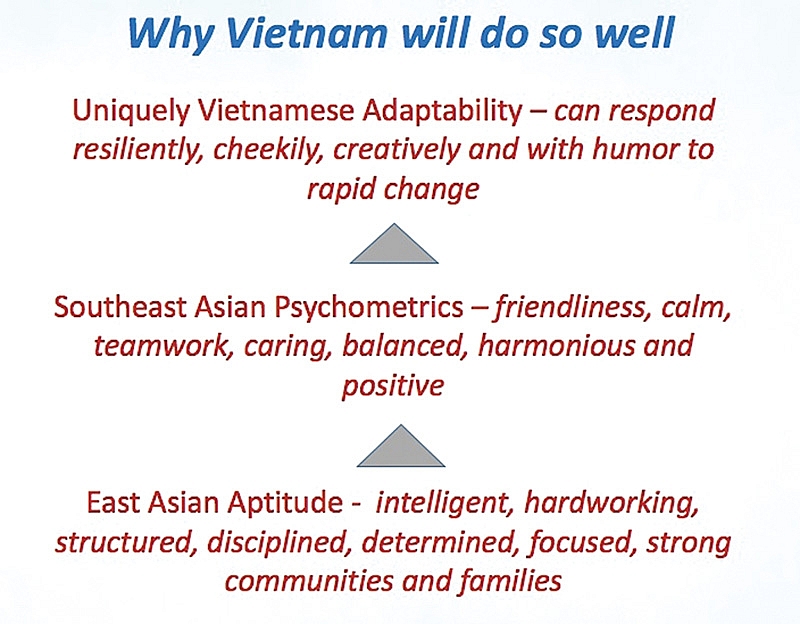How Vietnam’s culture spurs economic success
He produced a performance chart showing how the Vietnamese fresh graduates started at about 70 per cent the level of their Japanese experienced programmers. Then after three years training by Japanese experts including a year in Japan, the chart showed the Vietnamese programmers well over 90 per cent. I asked him that if that performance line progressed and the Vietnamese overtook the Japanese, would the training program be reversed and the Japanese would be taught by the Vietnamese? He thought I was joking, but I was absolutely serious.
 |
| By Colin Blackwell - Founder at Enablecode and chairman of HR Committee Vietnam Business Forum |
I know many of the top global multinational companies whose best performing country in the world is Vietnam. They totally attribute this to the performance of their Vietnamese staff being better than anyone else. Hence they have delegations of Americans, Europeans and yes Japanese coming to Vietnam on fact-finding missions to see how the Vietnamese perform so well. I have heard of this especially in sectors such as technology research, financial services and software.
So what combination of factors leads to such excellent people performance in Vietnam? For that we have to look more closely into the Vietnamese character and how that translates into business strengths. After over twenty years of observing this as an expatriate human resources specialist, my theory is that there are three layers to the Vietnamese character…
The foundation of that character is East Asian. Culturally, linguistically and ethnically the Vietnamese have much more in common with people from for example Korea and Japan than from Thailand or the Philippines. This provides an underlying aptitude which is seen in Vietnamese characteristics of being intelligent, hardworking, structured, disciplined, determined, focused, with a strong emphasis on communities and families. It is these characteristics that make East Asia one of the most dynamic places in the world.
But nobody is perfect, and listening to many people across East Asia they often seem to me stressed out and complaining. Whilst much of the world looks enviously upon their success, my conversations with them are often along the lines of “the cost of going out for a coffee in Shanghai is ridiculous” or “my colleagues are upsetting me about this, that and the other”. All of that drive and ability crowded together can turn into over-competitiveness and unhappy teams.
But Vietnam is different. People are relaxed, smiling and having a great time together as friends in offices. They are individually strong, but come together in teams to be even stronger as a unit, rather than turn competitiveness inwards. This is the first way Vietnamese can outperform other East Asians as they “gang up” in a positive way towards a common purpose and success.
So where does that come from culturally? My theory is that they were fortunate to have assimilated all of the best parts of Southeast Asian culture and layered that on top of that East Asian foundation. Over the course of millennia, the original Vietnamese in the north moved south along the coast, benefitting from the rich cultures such as the Chams that were already there. From these cultures came the characteristics of friendliness, calm, teamwork, being caring, balanced, harmonious and having a positive outlook.
 |
So this combination is already as you can imagine powerful in itself. But there is more. There are some truly unique things about the Vietnamese. The final third layer of the Vietnamese character is a special adaptability. This can be seen in their ability to respond resiliently, cheekily, creatively and with humour to rapid change. In the age of transformation, it is this last characteristic in particular which will propel the Vietnamese to be potentially the most successful in the world.
Now I have been telling many Vietnamese for over twenty years that they have the potential to be the best in the world. Many Vietnamese and foreigners think I am misreading the situation or exaggerating. They point out Vietnam’s relative poverty in comparison to other countries and think that is something justified or permanent. But it is a mistake to blame past poverty on the ability of the Vietnamese people. Vietnam, through no fault of its own, has had a challenging recent history which put the economy on a very low, war damaged base to build on. The Vietnamese have always been smart, but circumstance temporarily set them back. They are now reclaiming their deserved place amongst the more affluent successful economies of the world.
This potential and assured economic success was the first thing I recognised when I arrived here in 1995. The poverty rate was indeed over 60 per cent then, but the strength of the Vietnamese character always shone through the hardship. Others mistook the poverty for inability. I remember vividly an occasion back then, where an Asian expatriate invited me to a very pleasant meal of his national cuisine. In all seriousness, he cautioned me “do not eat the local food as it will make you stupid”. Naturally I politely told him off for his own stupidity and maintained my unwavering view that there was a massive potential here. We cordially agreed to disagree, but my parting words were “just you wait and see..”.
That was a long time ago and whilst I remember the discussion, the other person is long gone and no longer in contact. But if I did meet him again today, I would proudly champion Vietnam’s outstanding achievements since then, that justified my faith in the potential of the Vietnamese. Over the last twenty years, Vietnam has had the fastest rate of wealth creation in the world. It is also projected to have the fastest wealth creation in the world for the next twenty years as well. The world is a competitive place and this does not happen by accident. It is only possible with the amazingly successful Vietnamese character.
Vietnam is now officially a middle income country, but to me at least, will inevitably become a first world country quicker than most people expect. This view is supported by Vietnam’s performance in a number of “leading indicators” that are a positive sign of continued future potential. For example; school level academic performance using the global PISA measures has the average Vietnamese smarter than the average person in my own country Britain; Vietnam’s export performance makes it the most internationalised large economy the world has ever seen; and Vietnam has the second highest rate of adoption of consumer artificial intelligence devices in the world.
So Vietnam is following the same inevitable path to being an advanced economy as its East Asian neighbours, albeit later due to the history imposed upon it externally. But what does this mean in practice for a foreign investor looking to ride upon this path of success? The booming Vietnamese consumer market is evident from the still growing spending power of local consumers. It is widely recognised that Vietnam is one of the largest most attractive markets to sell goods into, so investors in this category need no further encouragement to come here, as they are most likely here already. But what about those looking to set up manufacturing or services export here?
It is true enough that Vietnam took is first steps on the path to economic growth with cheap labour. It is also true that there remain large low skilled production industries in Vietnam. But many people would be surprised to know the level of artificial intelligence powered robotic automation happening in the new factories. Much of the new manufacturing is literally the most advanced technology in the world. This is made possible by not only the modern equipment but by the excellent ability of the Vietnamese workforce. Investors these days are more often coming to Vietnam for is high skilled workforce rather than low cost advantage.
As the world is transformed by technology, the jobs of the future are increasingly requiring the exact combination of characters and skills the Vietnamese excel at. This is great not only for the well deserving Vietnamese, but also for those investors who appreciate the true advantages of this exceptional country.
What the stars mean:
★ Poor ★ ★ Promising ★★★ Good ★★★★ Very good ★★★★★ Exceptional
Themes: Together We Win
- Greater Mekong Subregion executives to discuss sustainable tourism
- TCPVN donates 1,200 medicine bags to COVID-19 patients in southwest
- AB InBev supports orphans with scholarships amid COVID-19
- Evaluating the reach of support in turbulent times
- Gamuda Land grants “Back to School” scholarships to support disadvantaged students
Related Contents
Latest News
More News
- Japanese business outlook in Vietnam turns more optimistic (January 28, 2026 | 09:54)
- Foreign leaders extend congratulations to Party General Secretary To Lam (January 25, 2026 | 10:01)
- 14th National Party Congress wraps up with success (January 25, 2026 | 09:49)
- Congratulations from VFF Central Committee's int’l partners to 14th National Party Congress (January 25, 2026 | 09:46)
- 14th Party Central Committee unanimously elects To Lam as General Secretary (January 23, 2026 | 16:22)
- Worldwide congratulations underscore confidence in Vietnam’s 14th Party Congress (January 23, 2026 | 09:02)
- Political parties, organisations, int’l friends send congratulations to 14th National Party Congress (January 22, 2026 | 09:33)
- Press release on second working day of 14th National Party Congress (January 22, 2026 | 09:19)
- 14th National Party Congress: Japanese media highlight Vietnam’s growth targets (January 21, 2026 | 09:46)
- 14th National Party Congress: Driving force for Vietnam to continue renewal, innovation, breakthroughs (January 21, 2026 | 09:42)

 Tag:
Tag:



















 Mobile Version
Mobile Version